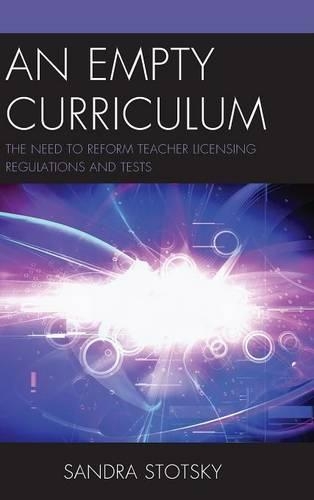
An Empty Curriculum: The Need to Reform Teacher Licensing Regulations and Tests
(Hardback)
Available Formats
Publishing Details
An Empty Curriculum: The Need to Reform Teacher Licensing Regulations and Tests
By (Author) Sandra Stotsky
Bloomsbury Publishing PLC
Rowman & Littlefield Publishers
24th February 2015
United States
Classifications
Professional and Scholarly
Non Fiction
Teaching skills and techniques
371.1
Physical Properties
Hardback
160
Width 160mm, Height 238mm, Spine 18mm
417g
Description
Teachers cannot teach what they do not know. This country has tolerated a weak licensing system for prospective teachers for decades. This weak system has been accompanied by an increasingly emptier curriculum for most students, depriving them of the knowledge and skills needed for self-government. An Empty Curriculum: How Teacher Licensure Tests Lead to Empty Student Minds makes the case that the complete revision of the licensing system for prospective and veteran teachers in Massachusetts in 2000 and the construction of new or more demanding teacher licensing tests contributed significantly to the Massachusetts education miracle. That miracle consisted of enduring gains in achievement for students in all demographic groups and in all regional vocational/technical high schools since 2005gains confirmed by tests independent of Massachusetts policy makers. The immediate purpose of this book is to explain what Massachusetts did in 2000 to strengthen its teacher licensing and re-licensing system to ensure that all teachers could teach to relatively strong K-12 standards. Its larger purpose is to suggest that development of strong academic standards in all major subjects should be followed by complete revision of a states teacher licensing system, not, as has been the case for several decades, the development of K-12 student testsif this country wants to strengthen public education.
Reviews
May 2016 Book of the Month. Stotsky has recently devoted her time to warning about the academic weakness of Common Core. She helped create Massachusetts English and Math standards, which were excellent before the state fell prey to Common Core. If states move forward with evidence-based reforms in teacher preparation, then failed Common Core student standards would have less impact. Well-trained teachers imparting subject matter over which they have mastery could have a greater impact on students than standards. * Education Reporter *
During my twenty-seven years with the Department, I worked with thirty colleges and universities to help them prepare for the states review of their licensure programs. Under Dr. Stotskys leadership, we were able to put into practice many of the long-needed changes in teacher preparation and licensing that she discusses in An Empty Curriculum: The Need to Reform Teacher Licensing Regulations and Tests. These little miracles all contributed to the larger onethe remarkable and sustained increase in student achievement among all demographic groups in Massachusetts since 2005. -- Margaret L. Cassidy, formerly with the Office of Educator Preparation and Quality, Massachusetts Department of Elementary and Secondary Education
Sandra Stotsky has done a great service to this country as well asMassachusettsin leading the effort to strengthen teacher training and assessment in order to address the provisions of the Education Reform Act. Our students' success inMassachusettswas due in large part to the work ofclassroom teachers. Assuring that those teachers have proper content knowledge and strong academic backgrounds to teach their subject, as her book details, proved invaluable. -- David Driscoll, former Commissioner of Education, Commonwealth of Massachusetts
Although it is difficult to find a lucid discussion of the design, development, and implementation of teacher licensing tests in available sources, Sandra Stotsky has done a wonderful job of articulating the thinking that occurred at each phase of the development or revision of the subject area tests she was responsible for in Massachusetts. She explains the various professional views of the educators and policy makers with whom she engaged in her efforts to ensure that prospective teachers brought a strong academic background to their first teaching experiences. Stotskys book is a must-read for anyone interested in understanding how the licensure regulations and teacher testing programs she developed contributed to the "Massachusetts education miracle." Her book should also be read by those seeking to create a high quality state education system because it clarifies an important componentteacher licensing teststhat is often overlooked in education reform strategies. -- William Phillip Gorth, PhD, cofounder and former president of National Evaluation Systems, Inc.
In her new book, An Empty Curriculum: The Need to Reform Teacher Licensing Regulations and Tests, Sandra Stotsky, professor emerita of education at the University of Arkansas, offers a tested model of teacher knowledge, explains why its not being used, and describes strategies for overcoming the education establishments resistance. Stotskys credentials for this task are impressive: in her role as senior associate commissioner at the Massachusetts Department of Elementary and Secondary Education from 1999 to 2003, she oversaw complete revisions of the states pre-K-12 standards as well as its teacher-licensure standards. Until these standards were replaced by the Common Core in 2010, Massachusetts ranked first among the states in educational achievement. -- Mary Grabar, PhD, resident fellow at the Alexander Hamilton Institute for the Study of Western Civilization in Clinton, New York * City Journal *
Author Bio
Sandra Stotsky is professor of education emerita, University of Arkansas, and was Senior Associate Commissioner at the Massachusetts Department of Elementary and Secondary Education from 1999-2003. She is the author of several books on curriculum and standards for K-12, and has published many reports and articles on teacher training and teacher licensing tests.
